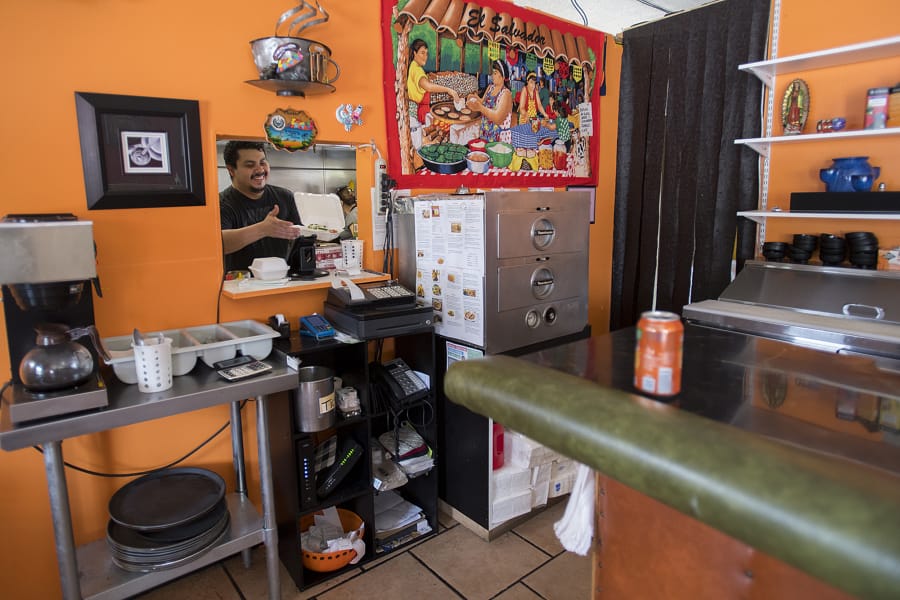Mi Casa Pupuseria Y Mexican Restaurant is just 7 months old and trying to adapt to the coronavirus pandemic by filling to-go orders.
“It’s kind of slow, you know?” said one of the owners, Roberto Ayala. He hopes the pandemic is over soon. “I think that’s a dream for everybody.”
Ayala specializes in dishes from his home country of El Salvador, such as pupusas (stuffed tortillas) and fried plantains, but he also cooks up traditional Mexican fare at his central Vancouver restaurant.
“People are nice. They try to support us,” Ayala said.
The business plans to apply for support through Fourth Plain Forward, one of several organizations that received funding from the Community Foundation for Southwest Washington. The regional philanthropic hub used its SW Washington COVID Response Fund to support local Hispanic and Latinx organizations.
The League of United Latin American Citizens, Latino Community Resource Group and the Clark County Latino Youth Conference and other groups were already collaborating around the 2020 Census to ensure a complete population count prior to the emergence of COVID-19. Diana Avalos-Leos, executive director of the Clark County Latino Youth Conference, said the groups have now pivoted to address needs and service gaps during the pandemic.
There have always been systemic inequalities among the Latino population, Avalos-Leos said, but “COVID-19 has made those so clear.”
Outsized impact
As of Tuesday, people of Hispanic descent represented 13 percent of the state’s overall population but 30 percent of confirmed COVID-19 cases, according to the Department of Health.
However, LULAC state director Diana Perez said, data is missing. In 35 percent of cases, race or ethnicity is unreported, making it less clear how prevalent COVID-19 is among Hispanics — many of whom are essential workers.
According to a survey of 1,200 Latinos done by political research firm Latino Decisions and care provider network Somos, more than one in five know someone with the virus and nearly two-thirds of Latino households have faced either a job loss, reduction in hours or wages, or lost their self-employment.
Ed Hamilton, president of the local LULAC council, said mixed status households with an undocumented family member or someone who only has an employee identification number can’t access CARES Act funding or other federal benefits.
“Those alone eliminate three-fourths of our community,” he said.
Some people who were in the process of becoming citizens are in limbo with the court system largely closed and some immigration suspended.
Demand is high. In the first three days LULAC accepted applications for $500, $700 or $1,000 in financial relief for undocumented Southwest Washington residents, the program received 260 applications seeking $250,000 — $100,000 more than available. The vast majority of applicants were from Clark County.
Latino Community Resource Group received two other funds from the Community Foundation, one to pay for six months of mental health services, including group therapy and weekly Facebook live sessions, said the group’s executive director, Elizabeth Najera. The other fund, $105,000, will go toward housing assistance and basic needs for families.
The organization received 45 applications in one day.
“There is a really great need. I feel like that’s something we can’t stress enough,” Najera said.
Sharing information
Another aim of the Community Foundation funding is to get accurate information about the novel coronavirus out to communities of color, especially non-English speakers.
Hamilton said there is a lack of trust in the information being shared, so trusted messengers — these organizations that already have a foothold in the Hispanic community — need to disseminate accurate, understandable information.
“Widespread knowledge and communication is our biggest ally against this virus,” Perez said.
Perez said emergency declarations and website updates are first released in English with a “dangerously slow” translation to other languages. LULAC believes this is a violation of Title VI of the Civil Rights Act, which protects people from discrimination based on race, color or national origin when it comes to federal financial assistance.
In the meantime, the Clark County Latino Youth Conference used a $25,600 grant from the Community Foundation to develop infographics in English and Spanish that detail safe and healthy practices during the state’s stay-at-home order. Additionally, youth will share how COVID-19 has impacted their lives and how they are practicing healthy behaviors to support their families.
The group is also creating relevant videos, including one of a school social worker delivering a message. There was a Facebook live discussion about depression on Tuesday, and this evening, there will be a live Facebook chat about health and safety at work with a speaker from the Department of Labor and Industries.
“We knew we needed to pick up this work,” Avalos-Leos said.
Business outreach
Since the initial declaration of the stay-at-home order in March, more than 20 hair and nail salons have closed, as well as restaurants that don’t have the infrastructure for takeout or delivery. Language and technology can be a barrier to adapting to the new normal.
For some owners, their business is their only source of income; they didn’t receive a stimulus check or other government benefits.
Monica Santos-Pinachos, director of communications at the Columbia River Economic Development Council, said she’s working closely with Perez and Avalos-Leos to ensure information for businesses is available in multiple languages. The council offers a COVID-19 resource page in Spanish and recently recorded a video with the Small Business Administration — replicating what it had already done in English.
Santos-Pinachos doesn’t want to see Spanish-speaking businesses owners miss out on help because information isn’t available in their language. When it comes to first-come, first-served grants, it’s important that people access applications quickly, she said.
“We’re trying to make sure we have timely but factual information on our website,” she said.
Additionally, Sydney Johnson, district program coordinator with Fourth Plain Forward, received $177,500 in grant funding through the Community Foundation to support businesses owned by undocumented immigrants who don’t qualify for federal programs.
“This is our way to specifically support those folks, but we’re encouraging everyone to apply,” she said.
Providing help
Fourth Plain Forward is helping businesses in a variety of ways, whether by setting up online ordering, creating social media channels or translating information to English.
One concern among Spanish-speaking business owners is that there might be strings attached to the funding or they might have to pay to apply. Johnson said this reflects an increase in predatory lending where institutions may offer programs that put businesses deeper into debt. With sales down, owners desperate to pay rent and other expenses may be searching for any kind of financial assistance.
There are no strings attached to the funding businesses receive from Fourth Plain Forward’s grant and no cost to apply. It can be used for payroll or inventory or whatever is needed to sustain the business.
Johnson said there is also growing concern in the Fourth Plain community about commercial evictions. Updated information about the state’s eviction moratorium is not reaching the corridor, and people are concerned landlords will take advantage of them during the crisis. People worry how the pandemic will impact their small businesses in the long run.
“Business owners are scrambling to find financial assistance from local, state and federal levels. Some have applied to these programs but have not received any funding or were denied,” Johnson said in an email. “It is concerning that these funds are not going to businesses owned by people of color who have been disproportionately impacted by the COVID-19 crisis.”
Through Fourth Plain Forward, businesses can apply for up to $10,000 in assistance, but the funding is limited so not everyone can be helped. Johnson said she’s working on identifying other resources. Information is available on Fourth Plain Forward’s website and social media.
What’s next?
Perez is interested in what happens after COVID-19.
“How are we going to support our communities as we slowly transition back?” she said. “I don’t think we’re going to go back to how things operated before.”
Najera agreed there’s an opportunity to pave the way for how things could be in the future. During discussions about recovery and what that looks like, Perez wants to see voices at the table that can speak to structural inequities.
“The last thing we need is when we recover, we ignore those inequities,” Perez said.




